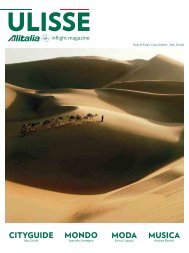You also want an ePaper? Increase the reach of your titles
YUMPU automatically turns print PDFs into web optimized ePapers that Google loves.
KNOW INTERVISTA<br />
museo più visitato al mondo, è al 21esimo posto, come ho letto in<br />
una classifica redatta nel 2013 dal magazine The Art Newspaper.<br />
Nell’ultima pagina de “L’Idiota” di Dostoevskij il principe<br />
Myskin dice che la bellezza salverà il mondo. Noi ci salveremo<br />
grazie alla nostra bellezza?<br />
Sa che non lo so? Sto aspettando… Io ho già visto un’Italia in difficoltà<br />
perché sono nato nel 1941 e quindi ho conosciuto il dopoguerra.<br />
Ma quell’Italia, benché povera e messa in ginocchio dal<br />
conflitto bellico, era una Italia fortemente desiderosa di futuro. Ora<br />
mi sembra che siamo solo rassegnati.<br />
La classe dirigente di oggi è la causa o l’effetto di questa rassegnazione?<br />
Credo che a un certo punto causa ed effetto siano diventati come il<br />
cane che si morde la coda. Guardiamo il mio settore: perché dopo<br />
40 anni che ripetiamo la necessità di una formazione musicale nelle<br />
scuole nulla è successo? In tutti questi anni in cui io ho lavorato in<br />
Italia, 12 a Firenze e 19 alla Scala, non ho mai visto uomini politici,<br />
a parte due o tre, venire abitualmente a teatro, luogo frequentato<br />
dalle istituzioni solo nelle occasioni speciali o, peggio ancora, in<br />
quelle mondane. Questo è gravissimo.<br />
Perché? Me lo dica lei…<br />
Perché noi abbiamo perso la nostra identità o non crediamo più al<br />
suo valore, come il vecchietto nella nebbia del film “A<strong>mar</strong>cord”, se<br />
lo ricorda? «Mi sono perso», dice. Ecco noi siamo come quel vecchietto,<br />
ci siamo persi non nella nebbia ma dietro a mezze figure,<br />
che anche quando parlano evidenziano la loro pochezza, nell’uso<br />
di un linguaggio spesso banale se non addirittura volgare.<br />
E la soluzione?<br />
Adesso lei sorriderà e mi prenderà per matto, ma la musica sarebbe<br />
uno strumento incredibile. Pensi alla etimologia del termine sinfonico:<br />
“sun phonos”, suonare insieme. Tante parti, diverse l’una<br />
dall’altra ma che muovendosi contemporaneamente e non disturbandosi<br />
tra loro, bensì aiutandosi, producono il bello con la B maiuscola.<br />
L’armonia è concetto comune, non individualistico. L’insegnamento<br />
della musica non è il ‘piffero in bocca’, ma instillare<br />
un principio civico fondante una società partecipata e rispettosa. In<br />
un’orchestra tutti contribuiscono all’armonia totale. E la dissonanza,<br />
come momento di tensione e di crisi, c’è e ci deve essere per<br />
poi però confluire in una consonanza. Allora usciremo dalla nebbia.<br />
towards what is beautiful. While it is a drama, or rather “the”<br />
drama of our country, when it is a sign of negligent management.<br />
For example, the Uffizi Gallery, instead of being the most visited<br />
museum in the world, is in 21st place, as I read in a 2013 list in<br />
The Art Newspaper.<br />
On the last page of Dostoevsky’s “The Idiot”, Prince Myshkin<br />
says that beauty will save the world. Will our beauty save us?<br />
I don’t know. I’m waiting... I have already seen Italy in trouble,<br />
because I was born in 1941 and lived through the post-war period.<br />
But that Italy, although poor and brought to its knees by<br />
conflict, was strongly desirous of the future. Now it seems we are<br />
merely resigned.<br />
Is today’s ruling class the cause or the effect of this resignation?<br />
I think at some point cause and effect have become like the dog<br />
chasing its tail. Let’s look at my sector: why, after 40 years of<br />
repeating the need for music education in schools, has nothing<br />
happened? In all the years I’ve worked in Italy, 12 in Florence<br />
and 19 at La Scala, I’ve never seen politicians, except for two or<br />
three, come regularly to the theatre, a place frequented by institutions<br />
only on special occasions, or even worse, for society events.<br />
This is very serious.<br />
Why? Please tell me...<br />
Because we have lost our identity, or we no longer believe in its<br />
value, like the old man in the fog in the film “A<strong>mar</strong>cord”, remember?<br />
“I’m lost”, he says. Here we are, like the old man, not<br />
lost in the fog but behind half figures, who even when they speak<br />
show their smallness, using language that is often banal if not<br />
downright vulgar.<br />
And the solution?<br />
Now you will smile and think I’m crazy, but music would be an incredible<br />
tool. Think of the etymology of the word symphony: “syn<br />
phonos”, playing together. Many parts, all different but moving<br />
together without disturbing each other, helping to produce beauty<br />
with a capital B. Harmony is a shared concept, not individualistic.<br />
The teaching of music is not “tootling on a whistle”, but instilling<br />
a fundamental civic principle of a participatory, respectful<br />
society. In an orchestra, all contribute to the total harmony.<br />
And dissonance must be there, as a moment of tension and crisis<br />
flowing into harmony. Then we will come out of the fog.<br />
©Todd Rosenberg<br />
68 ULISSE MARZO 2015




